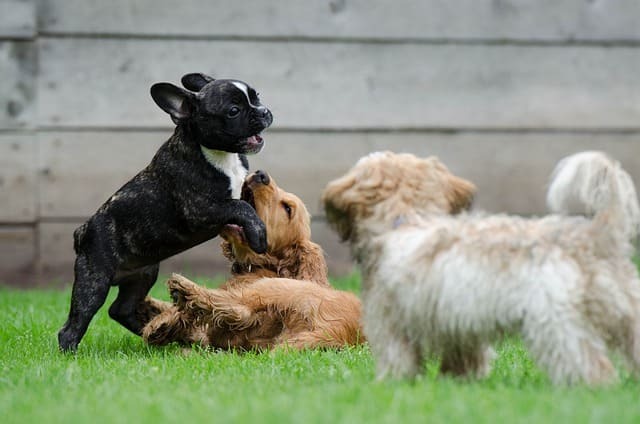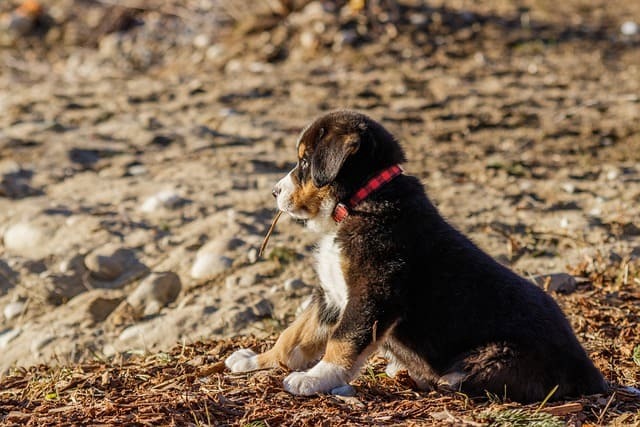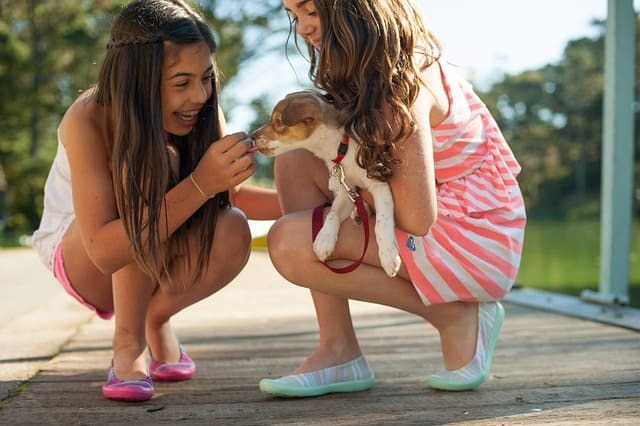















 Back
Back
Fear Periods in Your Puppy Socialization
Even though fear periods are a normal part of puppyhood and of the socialization process, they can also be incredibly overwhelming for your pup. Here’s everything you need to know.

Writer Animalia Team

Getting a puppy? Congratulations and good luck! Puppies require a lot of care and attention, but you’ll be rewarded handsomely with lots of love and affection.
Part of being a pet owner is understanding your puppy’s developmental stages and the behaviors associated with each one. Puppies can begin training and socialization quite early, starting at about two weeks of age. During this stage, puppies are just learning how to play and interact with humans and other dogs.
Some development stages will catch you off guard, especially if you’ve never owned a puppy before. Your puppy’s fear periods may prove especially surprising and challenging. Puppies develop full use of all their senses at around 7 to 9 weeks of age. They start discovering new smells and their eyesight gets stronger. All these new sights and smells can quickly become overwhelming. As such, you’ll find that your new pup becomes easily spooked and startled. A confident dog can seem to transform overnight into a skittish, avoidant one. But this doesn’t mean you’ll have a fearful dog for life.
What are puppy fear periods?
A fear period is exactly what it sounds like. It’s a developmental stage where a dog’s brain sends more distress signals than usual. From a survival standpoint, puppy fear periods make a lot of sense. Your dog’s genetic heritage has programmed them to stay alert and outwardly focused. These fear periods are meant to help dogs develop their “fight or flight” instincts, which are vital for canines in the wild.

Because fear periods are evolutionarily programmed into your pup, no amount of socialization can prevent them. Even though fear periods are a normal part of puppyhood, they can also be incredibly overwhelming for your pup. During the fear stages, a single intimidating or painful experience could scar your pup for life and impact the way they respond to that stimulus.
Fortunately, there are plenty of steps pet owners can take to help puppies emerge from fear periods as confident, courageous canines.
Fear period #1: 8-11 weeks
At about eight weeks, puppies start to become incredibly fearful, seemingly out of the blue. Everyday objects and experiences may alarm puppies even if they didn’t inspire a reaction before. This fear period happens right around the time they leave the comfort of their mom and littermates.

The first fear period is an incredibly vital part of early socialization. It’s important to recognize that pups are quite impressionable at this age and should not be pressured or forced to interact. You’ll want to create as many positive experiences with people, other animals, and new situations as possible. Make sure to cheer them up and give them some soothing reassurance to help them work through their fear.
Fear period #2: 6-14 months
The second fear imprint period occurs between 6 to 14 months of age. Small-breed dogs tend to go through this period earlier than larger breeds. The second major fear period can be incredibly disorienting for owners. Remember, just because your pup looks like an adult dog doesn’t mean they’ve reached emotional maturity. Your dog still has a long way to go.
Fears at this stage tend to be more about situations rather than people or new animals. Handle your puppy’s new fears with patience and kindness and allow them the freedom to retreat from situations without fear of reproach.
How do fear periods affect socialization?
During fear periods, any negative, scary, or unpleasant situations can be potentially life-changing. While your dog may be able to quickly shake off the same experiences during other stages, they’re extremely sensitive to bad experiences during their early-life fear periods.
You may notice that your previously friendly, excitable dog becomes incredibly suspicious and reactive during these periods. Unfortunately, you can’t keep your dogs in a bubble. It is still important to introduce them to new people and experiences. That doesn’t mean you should force them to experience these situations, as doing so could create a lifelong fear. Just give them space to safely explore at their own comfort.

Remember, socialization is a lifelong process. Continue to reinforce positive behaviors and consider seeking the support of a behavioral specialist if your pup seems traumatized.
Training through fear periods (a step-by-step guide)
Dogs are naturally curious and adventurous. The sudden onset of fear means it will get harder to socialize them and introduce them to new stimuli. Puppies can grow too easily spooked for regular training.
Here’s a step-by-step guide on how you can turn a scary situation into a positive experience.
Step 1: Stay calm. Your puppy instinctively looks to you for cues on how to react to a new situation. Do not panic or react dramatically to fearful behavior. Use a relaxed tone to reassure your pup while resisting the urge to baby them. Doing this can wind up reinforcing bad behavior.
Step 2: Allow your puppy to move away from the trigger or fearful situation. Calmly move away and find a place where they can calm down. Forcing your dog to push through their fear will just make them more uncomfortable and harder to calm down.
Step 3: Redirect focus to something your dog enjoys. Dogs learn by association, so it’s important to diffuse the situation by building positive associations. Practicing commands like sit, stay, or roll over can help your puppy calm down. Treats and verbal reassurance can do more to help them feel more positive when they face a similar situation in the future.
Step 4: Desensitize your puppy to the trigger – but do it slowly. This means exposing your puppy to the situation they’re afraid of a little bit at a time. Look out for signs of stress or distress and remove the puppy from the situation immediately. This way, your puppy will feel safe enough to explore and start looking to you for direction.
Step 5: Supervise socialization during fear periods, especially if they’re playing with new dogs. It’s also a good idea to avoid other dogs whose behavior is unpredictable.
Tip: Avoid dog training methods that instill fear or suspicion, such as dominance training or using an e-collar, during puppy fear periods. Such methods can create long-term behavioral fallout.
Save on care throughout your dog’s life
From the puppy years into adulthood, pet insurance offers peace of mind and financial reimbursement for a range of expenses. Get a quote today and learn more about Animalia’s plans.





We offer the most comprehensive coverage
out there
Having Animalia is like a top-of-the-line
Rolls-Royce with a swimming
pool in the trunk.



Get your pet insurance quote
Pet type
- Dog
- Cat
What is your pet's name?
Zip code





